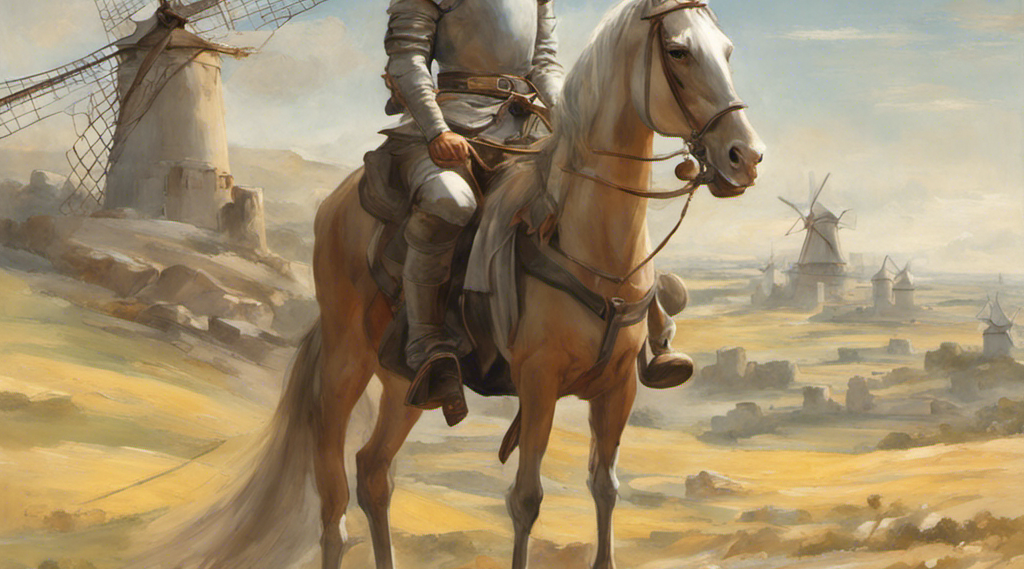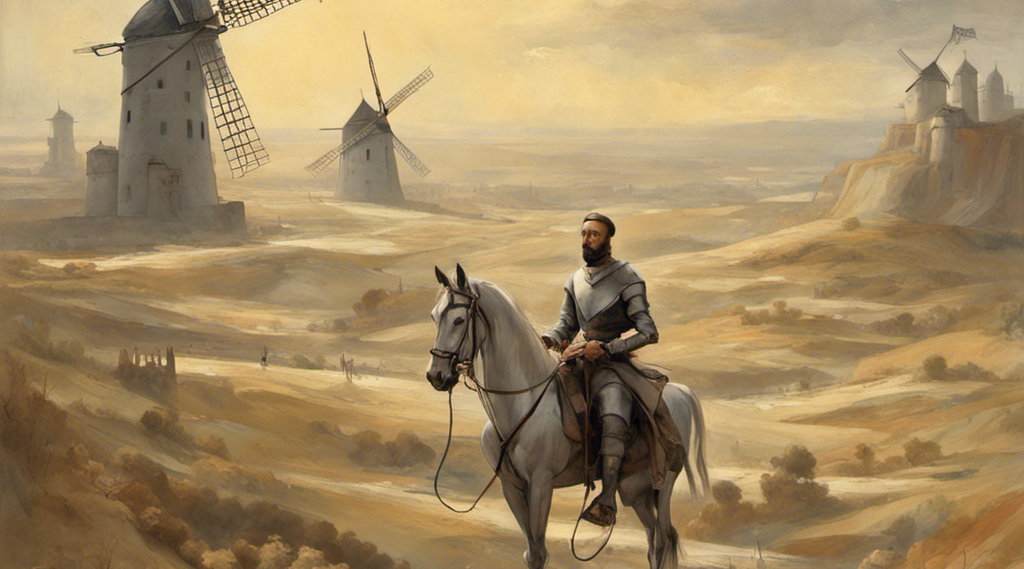Don Quixote: Rediscovering Chivalry Spirit

In the 17th century masterpiece, Don Quixote, acclaimed Spanish author Miguel de Cervantes Saavedra introduces readers to the concept of chivalry spirit, a fervent belief in knights and their noble virtues. Through the captivating adventures of the delusional yet endearing protagonist, Cervantes delves into the complexities of this romantic ideology, offering profound insights into human nature. Don Quixote’s unwavering commitment to chivalry spirit ignites a timeless discussion on the boundaries between reality and imagination, and the enduring allure of honor, bravery, and devotion. Embark on a journey through the pages of this iconic novel as we explore the depths of chivalry spirit, questioning its relevance in our modern world and discovering the profound impact it continues to have on literature and society.
What is Chivalry Spirit
Chivalry Spirit refers to the code of conduct and ideals that were followed by knights during the medieval period. Stemming from the medieval institution of chivalry, it embodied a set of values and virtues that governed a knight’s behavior both on and off the battlefield.
At its core, the chivalry spirit emphasized courage, honor, loyalty, respect for women, and a commitment to justice. Knights were expected to display bravery and prowess in combat, defending the weak and protecting the innocent. They were bound by an oath to serve their lord and country, dedicating themselves to the defense of their realm with unwavering loyalty.
One of the prominent principles of chivalry spirit was the concept of courtly love, which emphasized noble and chaste love towards women. Knights were expected to respect and protect women, treating them with courtesy and deference. They would often undertake quests or perform gallant deeds in the name of a lady, striving to prove their devotion and win her favor.
Honor and integrity were crucial aspects of the chivalry spirit. Knights were expected to keep their word, maintaining a high level of moral conduct and abiding by the rules of fair play. They were to refrain from cheating or using dishonest means to win battles, instead relying on their skill and prowess to achieve victory. Knights also demonstrated their honor through generosity and charity, showing kindness towards those in need.
The chivalry spirit also emphasized justice and the protection of the weak. Knights were expected to uphold the law, defending the innocent and ensuring the fair treatment of others. This concept of justice extended beyond the battlefield, as knights were encouraged to act as peacemakers and arbitrators in disputes.
The ideals of the chivalry spirit were not only exhibited in war and tournaments but also in everyday life. Knights were expected to be well-mannered and cultured, skilled in the arts of music, poetry, and dance. They were also encouraged to be religious and pious, drawing inspiration from their faith to guide their actions.
While the chivalry spirit may have been idealized, it played a significant role in shaping the behavior and values of knights during the medieval period. It served as a moral compass, guiding knights towards virtuous conduct and emphasizing the importance of embodying noble ideals.
Why is Chivalry Spirit Important to Us?
Chivalry spirit is important to us for several reasons:
1. Values and Ethics: Chivalry spirit encompasses values such as honor, courage, empathy, and integrity. These values form the backbone of a just and moral society. By upholding and embodying these principles, we create a better world for ourselves and future generations.
2. Respect and Kindness: Chivalry spirit promotes respect and kindness towards others, regardless of their gender, social status, or background. It teaches us to treat everyone with dignity, empathy, and compassion. This fosters harmonious relationships and helps build a more inclusive and understanding society.
3. Personal Growth: Practicing chivalry spirit helps in personal growth and self-improvement. It encourages individuals to strive for nobility in their actions, to be courageous in standing up for what is right, and to continuously work on becoming a better version of themselves.
4. Creating Positive Change: Chivalry spirit empowers individuals to take action against injustice and oppression. It urges us to stand up for those who are mistreated or marginalized, promoting equality and fairness. It inspires acts of kindness, generosity, and selflessness that can have a profound impact on individuals and communities.
5. Preserving Tradition: Chivalry spirit has deep historical roots and is associated with the medieval knights’ code of conduct. By embracing this spirit, we honor and preserve a rich cultural heritage that emphasizes virtues and principles that are still relevant today.
Overall, chivalry spirit is important to us because it guides our behavior, shapes our character, and influences our interactions with others. It fosters a society built on mutual respect, compassion, and fairness, ultimately leading to a better and more harmonious world.
Unlocking Chivalry Spirit from Don Quixote

Don Quixote Introduction
Don Quixote” written by Miguel de Cervantes Saavedra is a classic novel published in two parts in 1605 and 1615. The story follows the adventures of a middle-aged nobleman named Alonso Quixano who, after reading too many books about chivalry, loses his sanity and becomes a knight-errant who calls himself Don Quixote.
Quixote sets off on a series of self-proclaimed quests with his loyal squire, Sancho Panza. Deluded by his own fantasies, he believes that he is destined to revive chivalry, defeat evil, and win the heart of his imaginary lady-love, Dulcinea del Toboso, who is in reality a simple peasant woman.
However, Don Quixote repeatedly finds himself in absurd, comical situations as his lofty ideals clash with the mundane reality of the people he encounters. From tilting at windmills he mistakes for giants, to freeing wrongly imprisoned criminals who mock him, Quixote encounters a string of humorous misadventures.
Alongside the comical narrative, Cervantes weaves in deeper themes such as the power of imagination, the inconsistency of perception, and the contrast between idealism and reality. The book also serves as a critique of the outdated customs and traditions of Spanish society during Cervantes’ time, as well as a reflection on the nature of storytelling and literature itself.
Throughout the novel, the characters of Don Quixote and Sancho Panza develop a unique and complex dynamic. Sancho, initially motivated by the promise of wealth, gradually becomes more loyal to Quixote and adapts to his master’s delusions. Their relationship, a blend of camaraderie and exploitation, is a source of both humor and pathos.
“Don Quixote” is considered one of the greatest works of fiction in world literature. It pioneered the genre of the modern novel and has influenced countless subsequent novels and literary works. Its enduring popularity lies in its combination of humor, adventure, and philosophical reflection, making it a timeless masterpiece.
Chivalry Spirit Methods
In the book “Don Quixote,” Miguel de Cervantes Saavedra portrays the chivalry spirit through the character of Don Quixote. Here are some methods or principles of the chivalry spirit mentioned in the book:
1. Idealism and Imagination: Don Quixote is driven by an idealistic and imaginative view of the world. He creates his own reality by transforming everyday situations into chivalrous adventures. He believes in the power of dreams and sees himself as a knight destined to go on quests and defend the weak.
2. Code of Honor: Don Quixote adheres to a strict code of chivalry that emphasizes honor, loyalty, bravery, and the defense of the innocent. He believes in the virtues of a knight and follows them religiously, going as far as creating his own personal code. This code guides his actions and shapes his perception of the world.
3. Service and Protection: Don Quixote sees it as his duty to protect the weak, oppressed, and defenseless. He encounters various characters during his journey and takes it upon himself to be their champion, often intervening in situations that seem unjust or unfair.
4. Courtly Love: Don Quixote is also driven by the concept of courtly love. He idealizes women and envisions himself as a knight gallantly serving and winning the heart of his beloved, Dulcinea del Toboso. This notion emphasizes the romantic and emotional aspects of love, often expressed through lyrical language and poetic gestures.
5. Quest for Glory: Don Quixote embarks on a quest for fame, glory, and immortality. He believes that through his knightly deeds, he will achieve eternal fame and be remembered as a heroic figure. This quest for glory fuels his adventurous spirit and motivates him to face countless challenges, even when the outcome seems unlikely.
It’s important to note that throughout the novel, Cervantes also presents a satirical perspective on the chivalry spirit, highlighting the delusions and absurdities of Don Quixote’s actions.
Don Quixote Quotes
Don Quixote quotes as follows:
1. “Dulcinea del Toboso is the most beautiful woman in the world, and I am her captive knight.”
2. “All those you see up there were people of great importance in the world, and now they are reduced to bones in their graves.”
3. “Finally, … I determined that the true profession of chivalry was to undertake the defense of the oppressed and the wronged.”
4. “The truth may be stretched thin, but it never breaks, and it always surfaces above lies, as oil floats on water.”
5. “The road is always better than the inn.”
6. “Never trust, Sancho, in any government with a taste for the fabulous and incredible.”
7. “Every one is as Heaven made him, and sometimes a great deal worse.”
8. “A knight errant is a personage who wanders through the world, benefitting others and harming none, rescuing damsels from distress, protecting widows and orphans, and succoring the distressed.”
9. “Sleeping all the time, eating all the time and swimming in the suet of lazy goodness” – that’s the life for me!”
10. “Love and war are alike in that they render men mad.”

More Books About Chivalry Spirit
1. Secrets About Life Every Woman Should Know” by Barbara De Angelis:
In this empowering book, Barbara De Angelis explores the chivalrous spirit within every woman. Through her insights, she encourages women to embrace their strength, independence, and self-worth. By delving deep into the challenges faced by women in today’s society, De Angelis sheds light on the importance of chivalry from a feminine perspective.
2. The Road Less Traveled” by M. Scott Peck:
Although not specifically focused on chivalry, M. Scott Peck’s timeless classic delves into the essence of personal growth and spiritual development. Within its pages, readers will find valuable lessons that promote self-discipline, responsibility, and integrity – all integral qualities of the chivalrous soul.
3. A Distant Mirror” by Barbara W. Tuchman:
Barbara W. Tuchman’s masterpiece offers a captivating portrayal of the chivalrous spirit prevailing during the 14th century. Exploring the era of knights, chivalry, and courtly love, Tuchman provides readers with a fascinating account of the challenges, triumphs, and ideals that shaped the chivalric code. Through a historical lens, she offers valuable insights into the core principles of honor, loyalty, and nobility.
4. Man’s Search for Meaning” by Viktor E. Frankl:
At its core, the chivalrous spirit seeks to find meaning and purpose in life. Viktor E. Frankl’s profound memoir chronicles his experiences as a Holocaust survivor and psychologist. Through his profound insights on human nature and the pursuit of meaning, Frankl encourages readers to embrace personal responsibility, compassion, and the quest for a higher purpose – values that resonate deeply with the chivalric way.
5. “The Chivalry Code” by Quest of the Ultimate Knight:
Written as a guidebook for the modern knight, “The Chivalry Code” offers practical advice and insights on embracing chivalry in today’s world. Drawing inspiration from ancient chivalric values, this book explores the importance of honor, respect, courage, and kindness in personal and professional relationships. Through reflections, stories, and practical tips, readers will discover ways to embody the chivalrous spirit in their everyday lives.



0 Comments